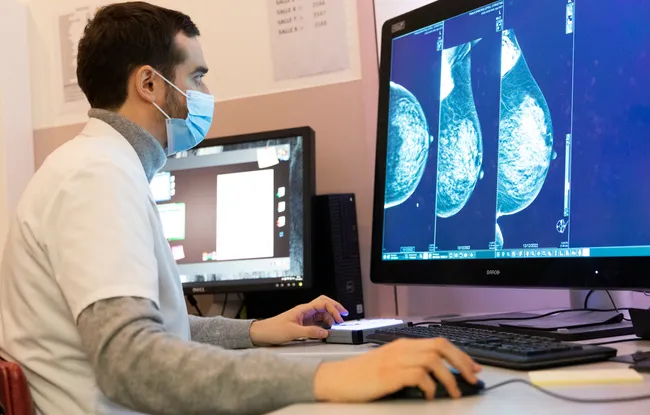- Home >
- Patients and Care >
- Cancer types >
- Breast cancer
Breast cancer

- Definition
- Symptoms and diagnosis
- Treatments
- After breast cancer
- Support care
- Breast cancer research
- Medical team
- Clinical trials
What is breast cancer?
Breast cancer is the most common cancer in women - it accounts for 33% of new cancer cases every year. It affects more than 60,000 women a year in France, but its survival rate is 87% at the five-year mark. It should be noted that less than 1% of breast cancers occur in men.
Cancer cells may be contained within the lobules (the group of glands that produce milk) or ducts of the breast (which carry milk), or they may invade nearby tissues, such as lymph nodes under the armpit. In the first case, we are talking about carcinoma in situ and in the second - of invasive carcinoma. Cancer cells can then pass into the blood and cause metastases.
The tumors at the origin of breast cancers are classified into four categories, which determine future treatment:
- Luminal cancer accounts for 70 to 80% of cases. Cancer cells have hormone receptors, and therefore hormones (estrogens and progesterone) play a role in the proliferation of cells. There is a "luminal A" type that has more estrogen receptors and a "luminal B" type that has slightly fewer of them.
- HER2+ breast cancer: In this case, the cancer cells overexpress the HER2 growth factor receptor on their surface. However, when activated, this receptor causes a significant proliferation of cells.
- Triple-negative breast cancer: Cancer cells do not express either estrogen or progesterone receptors and do not overexpress the HER2 receptor. It is considered more aggressive.
- Basal-like cancer is also often triple-negative, but the cancer cells express other modified proteins. It is therefore considered a separate type of cancer as well.
Metastatic breast cancers
15 to 20% of breast cancer patients will develop a metastatic form, that is to say that cancer cells, originating in the breast, will form tumors in other organs (often bones, lungs, liver, skin, or brain). These metastases can be present from the moment of diagnosis or appear later, in particular during a recurrence. They will have the same molecular characteristics as the original tumor and will require appropriate treatment.
Other breast cancers
There are rare or very rare forms of the disease: medullary, papillary, tubular or mucinous cancers, which generally have a good prognosis. Breast cancer can also be "inflammatory", especially in young women: the cancer cells cause inflammatory symptoms (red and hot breast, local and sudden pain, "orange peel" appearance) by blocking the lymphatic ducts under the skin of the breast. This is considered more aggressive than classic carcinomas.
Institut Curie, a referral center for the treatment of breast cancer
With more than 7,000 patients admitted each year, Institut Curie is the leading European center for breast cancer treatment.
The Institute of Women's Cancers
An expert in the treatment of women's cancers, Institut Curie offers patients an optimal and innovative range of care, which is specifically adapted to each of their needs.
 Institut Curie is co-founder of the Institute of Women’s Cancers, which was certified as a University-Hospital Institute in 2023. This project combines the scientific and medical requirements of Institut Curie, PSL University and Inserm for holistic management of patients affected by breast and gynecological cancers in order to better prevent and cure the disease, limit relapses, and mitigate the consequences in terms of quality of life. As a national referral center, doctors, caregivers, researchers, and patient associations combine their expertise to accelerate breakthrough innovations in breast and gynecological cancer for the benefit of women affected by the disease.
Institut Curie is co-founder of the Institute of Women’s Cancers, which was certified as a University-Hospital Institute in 2023. This project combines the scientific and medical requirements of Institut Curie, PSL University and Inserm for holistic management of patients affected by breast and gynecological cancers in order to better prevent and cure the disease, limit relapses, and mitigate the consequences in terms of quality of life. As a national referral center, doctors, caregivers, researchers, and patient associations combine their expertise to accelerate breakthrough innovations in breast and gynecological cancer for the benefit of women affected by the disease.
More information about the Institute of Women's Cancers
Institut Curie, the leading cancer center in France

- 50€
- 100€
- 150€
- 500€
- Montant libre
After tax deduction, your donation costs you 51.00€

